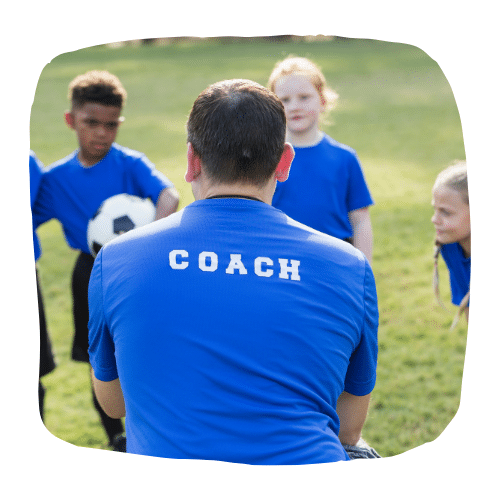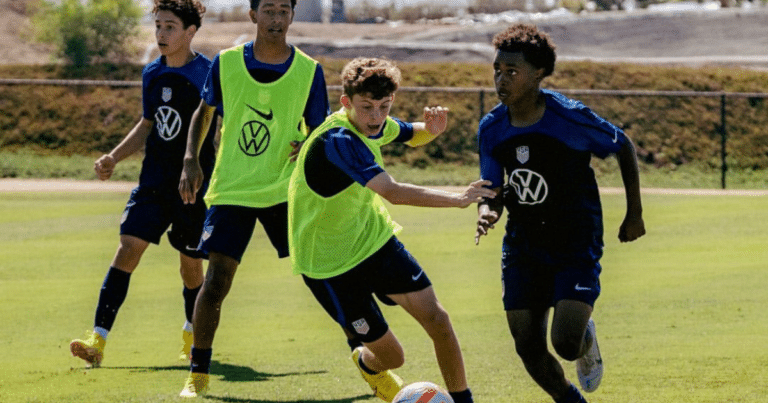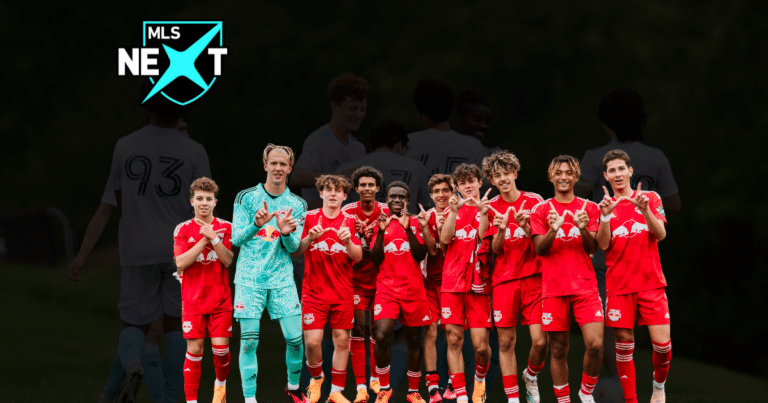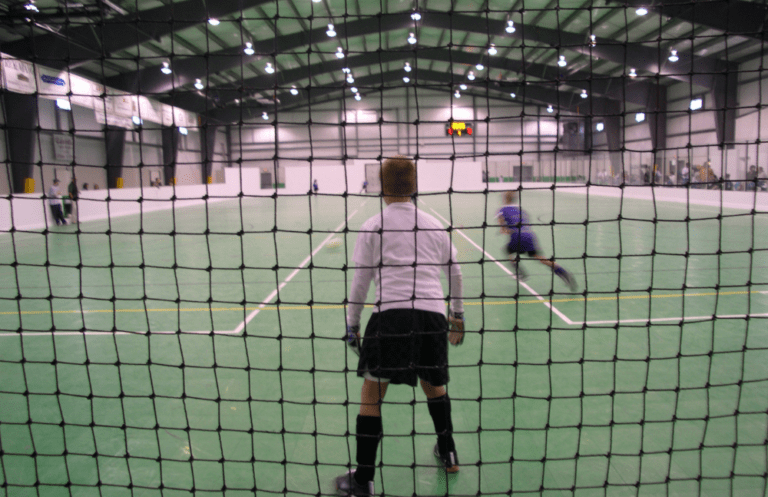Coaching Rec Soccer

If you are a first-time coach or have been coaching recreational soccer for a while, you know that coaching young players can be both rewarding and challenging. From happy goals to crying on the sidelines, there’s no shortage of events that go on.
Coaching youth soccer requires a unique set of skills, knowledge, and patience to effectively teach the game, keep the players engaged, and create a positive learning environment.
In this article, I will provide you with some practical tips and strategies to help you become a more effective coach and create a fun and successful experience for your players.
As a side note, I coached rec soccer for a few years and when I look back on it, those were some of my cherished moments on the soccer field! Seeing the kids develop and having fun made it all worth it.
What is Rec Soccer?
Recreational soccer, also known as “rec soccer,” is a program designed for young players to learn and enjoy the game of soccer in a fun and low-pressure environment.
In this section, we will discuss the concept of rec soccer, its key characteristics, and whether you should volunteer to coach soccer.
The Concept of Rec Soccer
Unlike competitive soccer (travel or club), rec soccer is not focused on winning or losing. Instead, it emphasizes player development and enjoyment of the game. Coaches aren’t being paid, they are volunteers that (hopefully) want to help children play a sport they might fall in love with.

Rec soccer is typically less structured and less formal than competitive soccer. It is often organized by local community centers, schools, or youth sports organizations. The goal is to provide affordable soccer programs that are accessible to all young players, regardless of their skill level or experience.
Key Characteristics
There are several key characteristics that define rec soccer programs:
- Emphasis on fun and enjoyment of the game
- Low-pressure, non-competitive environment
- Focus on player development rather than winning or losing
- Accessible to all young players, regardless of skill level or experience
- Affordable and often organized by local community centers, schools, or youth sports organizations
- Typically less structured and less formal than competitive soccer
Should I Volunteer to Coach Soccer?
Yes! Volunteering to coach a rec soccer team can be a rewarding experience for both you and your players.

As a coach, you will have the opportunity to help young players develop their skills, build confidence, and learn the value of teamwork and sportsmanship.
Most likely, you’ll be coaching your child. This can be a fun experience for both of you. If they are younger then even better! Just wait until they get to middle school…you may want someone else coaching them 😉
Coaching a rec soccer team can be a significant time commitment and a willingness to learn and adapt to the needs of your players. You will need to be patient, organized, and able to communicate effectively with your players and their parents.
If you are considering volunteering to coach a rec soccer team, it is important to understand the responsibilities and expectations that come with the role. You will need to attend practices and games, plan and organize drills and activities, and communicate regularly with your players and their parents.
Again, coaching rec soccer can be a fun and rewarding experience for those who are passionate about the game and committed to helping young players develop their skills and love for the sport.
Coaching Basics
As a coach, you have a significant role in shaping the future of young soccer players. Coaching rec soccer is a great way to give back to the community while also helping kids develop their soccer skills.
In this section, we will discuss the role of a coach and the skills required to coach recreational soccer.
Role of a Coach
The role of a coach is to create a safe and positive environment for the players to learn and grow. You are responsible for teaching the players the fundamentals of soccer, such as dribbling, passing, shooting, and defending. You should also focus on developing teamwork, sportsmanship, and a love for the game.
As a coach, you will also need to communicate effectively with the players and their parents. You should make sure that everyone is aware of the team’s goals and expectations. It’s also essential to provide feedback to the players (as a team and 1-on-1) and help them improve their skills.
Skills Required
To be an effective coach, you will need to have a few essential skills. These skills include:
- Basic Knowledge of the game: You should have a good understanding of the rules, strategies, and techniques of soccer. Here’s a helpful article to get you started.
- Patience: Coaching young players can be challenging, and it’s essential to have patience when working with them.
- Communication: You should be able to communicate effectively with the players and their parents.
- Organization: You will need to plan practices, and games, and provide updates if anything changes.
- Enthusiasm: You should have a passion for the game and be enthusiastic about coaching.
- Flexibility: You should be able to adapt to different situations and adjust your coaching style as needed.
Planning and Strategy
Developing a Practice Plan
To create an effective practice plan, you need to consider the age and skill level of your players. Always start with a warm-up activity to get your players moving and ready for practice.
Next, focus on skill development drills that are appropriate for the age and skill level of your players.
End the practice with something fun like a scrimmage or game to put their new skills into practice.
It’s essential to keep practices fun and engaging for your players. Incorporate games and challenges to keep their attention and make the practice enjoyable. Consider using cones, balls, and other equipment to create an obstacle course or target practice activity.
You should try to avoid kids standing still for too long. Eventually, they will start getting antsy and goof off. Then, the kids start feeding off each other and you’ll end up with mass hysteria!
Here is an example of a practice plan for a youth rec team:
| Time | Activity |
|---|---|
| 5 minutes | Warm-up (jogging, stretching) |
| 10 minutes | Dribbling drills – sharks and minnows |
| 10 minutes | Passing drills – two player passing |
| 10 minutes | Shooting drills – coach passes and player shoots |
| 10 minutes | Obstacle course – dribble around cones then shoot |
| 15 minutes | Scrimmage |
Choosing the Right Strategy
When choosing a strategy for your team, consider the strengths and weaknesses of your players.
For younger players, focus on developing individual skills and teamwork. As your players get older and they get more experience, you can start to incorporate more advanced strategies such as set plays and formations.
It’s important to communicate your strategy clearly to your players. Use diagrams and demonstrations to help them understand their roles and responsibilities on the field. Encourage your players to ask questions and provide feedback to improve their understanding of the strategy.
Remember, the most important thing is to keep the game fun and enjoyable for your players. Don’t put too much pressure on winning and losing. Instead, focus on developing their skills and love for the game.
For some coaches, the above may be difficult. You might be hardwired to try to win at all costs…just try to take a step back and realize they are so young and in a year it won’t matter. Also, consider getting an assistant coach to help you may be more on the ‘fun’ side so they can take some pressure off you.
Player Development in Rec Soccer
Improving Player Skills
Improving player skills is an essential part of player development. Here are some tips to help your players improve their skills:
- Practice, Practice, Practice: Yes, practice is important! Maximize this time you have together. Repetition is key to developing skills. Encourage your players to practice their skills both during team practices and on their own.
- Focus on Fundamentals: Teach your players the fundamental skills of soccer, such as dribbling, passing, and shooting. Ensure that they have a good understanding of these skills before moving on to more advanced techniques.
- Provide Feedback: Give your players constructive feedback on their performance. This will help them identify areas where they need to improve and work on them.
Promoting Teamwork
Promoting teamwork is also crucial to player development. Here are some ways to promote teamwork among your players:
- Encourage Communication: Encourage your players to communicate with each other on the field. Communication can help players work together more effectively and improve their performance.
- Emphasize Roles: Ensure that each player understands their role on the team. This will help them work together more effectively and improve the team’s overall performance.
- Foster a Positive Environment: Create a positive environment where players feel comfortable making mistakes and learning from them. This will help them develop their skills and work together more effectively.
- Encourage New Friendships: Rec soccer season usually runs for about two months. New friendships can be formed during this time. Encourage all your players to spend some time with each other outside of the field.
Game Day Management
In rec soccer games, equal playing time should be a priority. Also, putting players in different positions is beneficial to their development.
Preparing for Games
Preparing for games involves several steps that will help you and your team be ready for the match. Here are some tips to help you prepare:
- Create a game plan: Depending on the age, have a clear game plan that outlines the formation, positions, and strategies you will use during the game. It could be as simple as mixing up the starting line up based on skills.
- Communicate with parents and players: Communicate with parents and players about the game schedule, location, and any other important details. Make sure everyone knows what time to arrive and what to bring.
- Ensure equipment is ready: Check that all equipment is ready, including balls, cones, and goals. Make sure that there are enough balls for warm-up and that they are properly inflated.
- Conduct a pre-game warm-up: Have a pre-game warm-up that includes stretching, running, and ball work. This will help the players get physically and mentally prepared for the game.
- Arrive earlier than you told your parents: Maybe I’m old school, but I think arriving earlier than your team is a good way to show that you are committed to the team. I don’t care for coaches that are scrambling to get on the field 5 minutes before it starts.
Handling Game Day Challenges
Game day challenges can arise at any time, and it’s important to be prepared to handle them. Here are some common challenges you may encounter and how to handle them:
- Weather conditions: If there are weather conditions that may affect the game, such as rain or extreme heat, make sure to adjust your game plan accordingly. For example, if it’s raining, you may need to focus on short passes and ball control.
- Injuries: Injuries can happen at any time during the game. If a player gets injured, make sure to assess the situation and determine if they need medical attention. If they do, call to their parent for help immediately.
- Behavior issues: Behavior issues can arise during the game, such as players arguing with each other or not following the rules. If this happens, take a time-out and talk to the players about the importance of sportsmanship and following the rules. Don’t scold them but let them know that soccer should be fun. Let them go back out there to put that lesson to work.
You Want Them Coming Back Next Year
As a rec soccer coach, you want your players to have a positive experience and want to come back next year. Here are a few tips to help make that happen:
Make It Fun 🎉
The most important thing you can do is make sure your players are having fun. Keep practices and games engaging and enjoyable. Incorporate fun drills and games that keep everyone involved. Remember, at this level, the focus should be on developing skills and having fun, not winning.
At the end of the day…be that fun coach everyone wants to play for.
Encourage Positive Sportsmanship
Teach your players the importance of sportsmanship. Emphasize the value of teamwork and respect for opponents, teammates, and officials. Encourage players to congratulate their opponents after a game, win or lose. This will help build a positive environment and make the experience enjoyable for everyone involved.
Communicate with Parents
Keep parents informed about what’s going on with the team. Send out regular updates about upcoming games and practices and let them know what their child is working on. Make sure to communicate any concerns or issues in a timely and respectful manner.
Provide Feedback
Give your players feedback on their performance. Let them know what they did well and what they need to work on. Be specific and constructive in your feedback, and make sure to praise effort as well as success.
Be Organized
Make sure practices and games start and end on time. Have a plan for each practice and game and communicate it to your players and their parents. Make sure everyone knows where they need to be and when.
I hope that helps you get excited for your first or a new coaching year! Remember, you get to influence young kids and make them feel excited about the sport of soccer!
What’s really rewarding is seeing some of the kids you coached 5 years ago still playing. How cool is that?
Frequently Asked Questions
What is rec soccer?
What are some tips for coaching a youth soccer game?
How can I keep my team focused during soccer practice?
What’s the difference between rec and travel soccer?
In rec soccer, the focus is on having fun and learning the game, while in travel soccer, the focus can be on winning and developing advanced skills. Also, rec soccer is usually less expensive and requires less commitment than travel soccer.

Written By: SoccerNovo
SoccerNovo is an independent youth soccer media brand built to help parents, players, and coaches better understand the game and the pathways available in U.S. soccer. Our mission is to make youth soccer simpler, clearer, and more accessible for everyone involved in it.
Let’s connect





